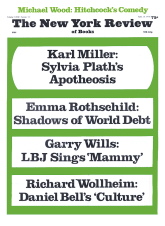In response to:
The People v. Patty Hearst from the April 29, 1976 issue
To the Editors:
“The People v. Patty Hearst” by Diane Johnson [NYR, April 29] was a wise and perceptive discussion of a case about which much egregious nonsense has been—and will yet be—written. My congratulations to her for a fine essay. Also my thanks to her for suggesting that testimony by well-qualified expert witnesses should count for more than testimony by those less qualified.
A small clarification should be noted regarding the subject of my fee. Ms. Johnson stated, “Jolyon West will charge some $1,000.” The fact is that I have never submitted a fee for testimony in a criminal trial. In all previous cases (only three in more than twenty-five years of psychiatry) I have provided expert testimony without charge, as a public service. I testified in the Hearst trial on the same basis—without fee. This was affirmed by defense attorney J. Albert Johnson in sworn testimony during the trial.
A charge of $920 had previously been submitted to the government for the twenty-three hours I spent in personal examination of Patricia Hearst at Judge Oliver J. Carter’s request prior to trial. However, by my instruction, this $920 was paid, not to me, but to the UCLA Foundation. Moreover, I waived additional charges of $5,400 for the total time I spent on the pretrial examination of Ms. Hearst for the court. My work included production of a very detailed and comprehensive clinical report (prepared in collaboration with Dr. Margaret Thaler Singer) of 136 pages plus attachments and bibliography.
Unfortunately the West-Singer report was never seen by the jury. The prosecution successfully objected to its admission into evidence. Furthermore, while some highly prejudicial tape recordings of Ms. Hearst’s voice were played in court, the jury was prevented—also by the prosecution’s objections—from hearing tape recordings I had made during interviews with her. Some of these recordings were deeply revealing of Patricia Hearst’s psychiatric disturbance. They also illuminated her mental and emotional state prior to—and during—the bank robbery with which she was charged, reflecting both her fearfully compliant condition under SLA control at the time, and her total absence of criminal intent.
Thus I must strongly agree with Ms. Johnson that the guilty verdict in the Hearst case derived from more than the general climate of hostility toward the defendant; more than the jury’s lack of imagination: more than the court’s decision to allow the prosecution to present considerable damaging material about events that transpired long after the bank robbery; more even than the deadly requirement for Patricia Hearst repeatedly to take the fifth amendment in the presence of the jury. The verdict was also a consequence of the prosecution’s success in keeping from the jurors a significant portion of the whole truth which, if they had learned it, might well have changed the outcome.
Louis Jolyon West, MD
Department of Psychiatry, UCLA
Los Angeles, California
This Issue
June 24, 1976



